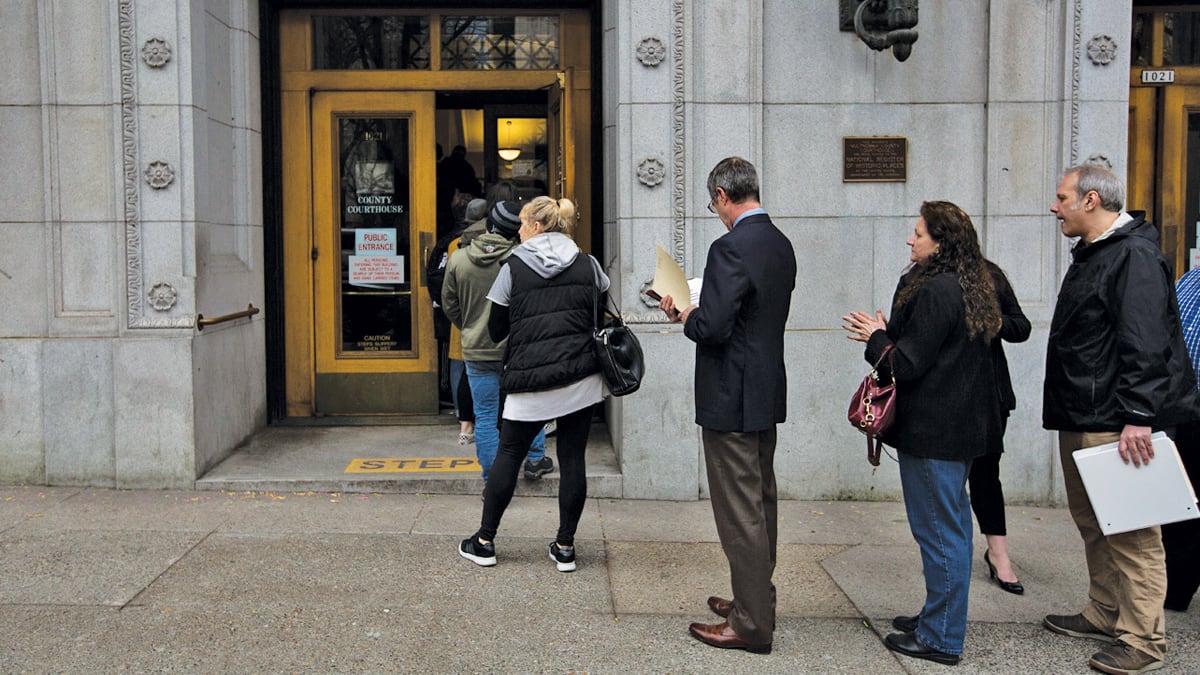On Jan. 25, Multnomah County Sheriff Mike Reese pledged his office wouldn't help President Donald Trump deport undocumented immigrants.
"I believe we have a responsibility to nurture a relationship of trust with everyone in our community," Reese said. "When our community trusts us, they share information about crime, and victimization, that they may not otherwise share—and that makes us all safer."
As early as Nov. 15, local officials pledged that Portland will remain a "sanctuary city" for undocumented immigrants, despite threats by Trump to remove federal funding from cities that don't help with deportations.
Those words are important. But Reese won't have to contend only with Trump, but with people in his own employ.
In late December, one of Reese's deputies allegedly helped deliver an undocumented immigrant to agents with U.S. Immigration and Customs Enforcement.
ICE agents apparently acted using information supplied by Deputy Larry Wenzel, emails obtained by WW show.
The Sheriff's Office has opened an internal affairs investigation into Wenzel's actions, says a spokesman. Reese declined to comment until the investigation is complete.
"What Oregon and Portland need to do now is stand up against the Trump administration," says Kasia Rutledge, an attorney with Metropolitan Public Defender Services whose client was arrested by ICE on Dec. 21. "So far, I have not been impressed with how our sheriff and local law enforcement have been responding."

The arrest of Rutledge's client came well before Trump took office Jan. 20. Lawyers and advocates say ICE appears to have raised its profile and the pace of its enforcement activity since then.
As WW first reported Jan. 28, plainclothes federal agents wearing T-shirts and jeans have arrested several immigrants in the past two weeks at the Multnomah County Courthouse, according to the American Civil Liberties Union of Oregon. Defense attorneys and other witnesses tell WW that ICE agents have also demanded names from people who appear to be minorities at the courthouse, and have taken custody of some people on their wanted lists.
It's hard to be sure whether those arrests mark an increase from ICE's typical activity. An ICE spokeswoman confirmed five arrests at or near a courthouse this month. But ICE has declined to disclose month-by-month statistics, and maintained that its instructions to officers are too sensitive to share with the public.
Local lawyers say the raids suggest a federal immigration agency emboldened by Trump's election and executive orders—and acting in ways that local elected officials may find more effective than they imagined.
"If underneath them their subordinates are sending people to the [ICE] Tacoma Detention Center, there's a problem," defense attorney Chris O'Connor tells WW. "There's no actual plan for the day-to-day interactions."
Related: Federal agents conducted immigration raids inside Multnomah County Courthouse.
Multnomah County officials, including Reese, County Chairwoman Deborah Kafoury and Presiding Multnomah County Circuit Judge Nan Waller, were alarmed enough to issue a joint statement Jan. 28.
"Anything that increases the fear of people accessing our courts is of grave concern," the statement said. "Now, they may be too afraid to show up."
The ICE arrests in Multnomah County come in the midst of nationwide uproar after Trump signed executive orders hostile to people born in other countries. Trump's orders included a Jan. 25 proposal to deny grant funding to cities that don't detain people for deportation, and a Jan. 27 travel ban blocking people from seven Muslim-majority nations from entering the United States.
In the wake of those orders, ICE and its sister agency, U.S. Customs and Border Patrol, emerged as the enforcers of Trump's crackdown.
As border agents held travelers in airports without charges over the weekend, large protests broke out at airports across the country—including Portland International Airport.

In Portland, ICE agents made 58 arrests in the month of January, five of them "at or near courthouses in Multnomah County," according to ICE Western regional spokeswoman Virginia Kice.
"With regard to enforcement actions at or in close proximity to courthouses, ICE has issued guidance to its personnel specific to that issue," Kice said. "However, due to law enforcement sensitivities, we haven't released the details of that guidance."
ICE officials said at least three of the people detained by ICE have significant criminal convictions, but they declined to provide names to verify the information.
Rutledge tells WW that Deputy Wenzel told her client, who faces domestic abuse charges and whose name she declined to provide, to come to the county's "close street supervision" office at the Multnomah County Justice Center on Southwest 3rd Avenue on Dec. 21 for a weekly pretrial check-in.
Rutledge says her client was initially asked to come in for his check-in at any time between 9 am and 5 pm. But the day before his appointment, she says, Wenzel called to tell him to come in specifically at 10 am—which is when the client and his mother found ICE agents waiting.
"When he and his mother came in, ICE was with the deputy, standing there behind the glass window," Rutledge tells WW.
She emailed Wenzel right away. "How did ICE know he was there?" Rutledge asked in an email.
"They asked when he would be here and I told them," Wenzel replied in an email obtained by WW.
After WW asked about Wenzel's actions, Reese issued a new memo to staff saying ICE "will be provided no greater information than is available to the public."
Wenzel could not comment on an open investigation.
Lane Borg, executive director of Metropolitan Public Defenders, says Trump's presidency is likely to have a chilling effect on immigrants participating in court proceedings, no matter how local law enforcement responds.
"I don't think people have thought through the implications," Borg tells WW. "Because it's not just defendants. It's witnesses. It's family members.
"People are going to have to dust off their history books and see what the original definition of 'outlaw' meant. It was people who live outside the protection of the law."
WW staff writers Rachel Monahan and Nigel Jaquiss contributed reporting to this story.

